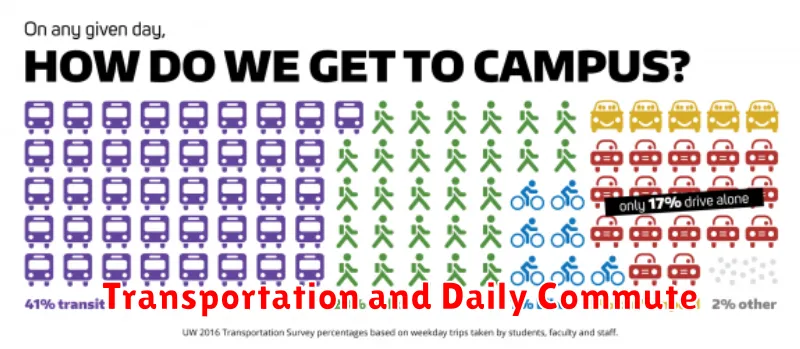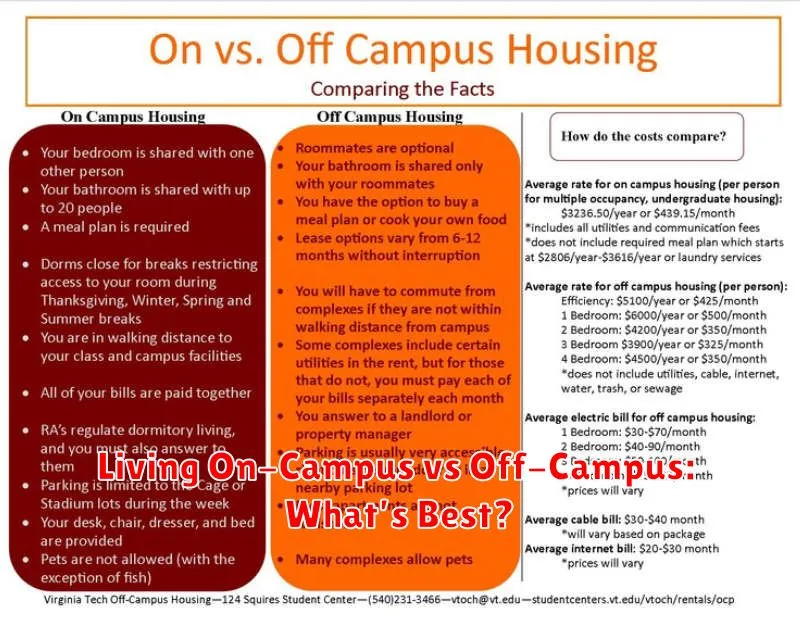Choosing between living on-campus and living off-campus is a major decision for college students. This choice significantly impacts not only your student life experience but also your finances and overall academic success. Factors like cost of living, proximity to classes, social life, and personal preferences play crucial roles in determining the best living arrangement. This article will delve into the advantages and disadvantages of both on-campus housing and off-campus housing to help you make the best decision for your individual needs and circumstances. We’ll explore the nuances of each option, weighing the pros and cons to provide a comprehensive comparison of on-campus vs. off-campus living.
Navigating the complexities of student housing can be challenging. Whether you prioritize the convenience of dorm life, the independence of apartment living, or the affordability of shared housing, understanding the full scope of each option is essential. Are you looking for the vibrant social scene associated with on-campus residence halls, or do you prefer the quiet and privacy of an off-campus apartment? This guide will explore crucial considerations such as meal plans, commuting, safety, and community involvement to help you answer the question: What’s the best choice for you – on-campus or off-campus living?
Pros and Cons of On-Campus Housing
Living on campus offers a convenient and immersive college experience. Proximity to classes, libraries, and other academic resources minimizes commute time, allowing for more study time and involvement in campus activities. The built-in social network of on-campus housing fosters a sense of community and facilitates making new friends. Convenience is another key advantage, with amenities like dining halls and laundry facilities readily available.
However, on-campus housing also has its drawbacks. Cost can be a significant factor, often exceeding off-campus options. Privacy is also limited, with shared rooms and communal bathrooms being common. Rules and regulations, such as quiet hours and guest restrictions, can feel restrictive to some students. Finally, space is often limited, particularly in dorm rooms, which can feel cramped, especially when sharing with a roommate.
Advantages of Off-Campus Living

Off-campus living offers students a greater degree of independence and freedom. You’re no longer subject to dormitory rules and regulations, allowing for a more personalized living environment.
Privacy is often a significant advantage. You can choose your roommates and have more control over your personal space.
Cost can be a benefit depending on the local housing market. Sharing a house or apartment with multiple roommates can sometimes be more affordable than on-campus housing.
Off-campus living can provide more space and amenities like a full kitchen, laundry facilities, and parking, which may not be readily available in dorms.
Cost Comparison Between Both Options
A crucial factor in deciding between on-campus and off-campus living is the cost. While on-campus housing offers a bundled rate, off-campus living requires navigating various individual expenses. Direct comparison can be challenging as costs vary significantly based on location, housing type, and personal lifestyle.
On-campus housing typically includes utilities, internet, and sometimes meal plans within the quoted price. This offers predictability and simplifies budgeting. Off-campus housing, however, necessitates factoring in rent, utilities (electricity, water, gas), internet, groceries, and potentially transportation costs.
While upfront costs may appear higher for on-campus options, hidden costs can quickly accumulate with off-campus living. Security deposits, renter’s insurance, and furnishing expenses are common additional off-campus costs.
Creating a detailed budget for both scenarios, encompassing all potential expenses, is essential for an accurate cost comparison.
Social Life and Community
A key difference between on-campus and off-campus living lies in the ease of social interaction and sense of community. On-campus housing often fosters a stronger sense of belonging. Proximity to other students, shared facilities, and organized events contribute to a vibrant social atmosphere. It’s easier to meet new people, form study groups, and participate in campus activities.
Off-campus living, while offering more independence, can sometimes make it more challenging to build a social network. It requires more effort to connect with other students and become involved in campus life. However, off-campus students can still build strong communities by joining clubs, attending campus events, and actively seeking out social opportunities.
Access to Campus Resources
A key differentiator between on-campus and off-campus living is the proximity to campus resources. Living on campus provides immediate access to libraries, computer labs, study spaces, and academic support services. This convenience can significantly impact academic performance, especially for first-year students adjusting to college life.
On-campus residents often benefit from 24/7 access to facilities and support staff. This can be particularly helpful during late-night study sessions or when seeking immediate assistance. Off-campus students may face travel time and restricted access hours, potentially impacting their ability to utilize these resources effectively.
Beyond academic resources, on-campus living also offers convenient access to campus amenities such as dining halls, recreational facilities, and health services. This centralized location simplifies daily life and fosters a stronger sense of community.
Transportation and Daily Commute

A crucial aspect of deciding between on-campus and off-campus living is your daily commute. Living on-campus often means a short walk to classes, eliminating transportation costs and time. This can be especially beneficial for early morning classes or inclement weather.
Conversely, off-campus living generally requires a commute. This might involve driving, cycling, public transportation, or a combination. Factor in potential costs like gas, parking permits, or bus fares. Commute time is also a significant consideration, potentially adding a considerable amount of time to your day. Traffic, parking availability, and public transportation schedules can all impact your commute.
How to Decide Based on Your Lifestyle
Choosing between on-campus and off-campus living hinges significantly on your preferred lifestyle. Consider your personality and priorities. Are you a social butterfly who thrives in a bustling environment? On-campus living often provides built-in social interaction.
Do you value independence and quiet time for focused study? Off-campus living offers greater control over your environment and allows you to tailor it to your specific needs. Think about your tolerance for shared spaces and potential disruptions.
Evaluate your preferred level of convenience. On-campus living often provides easy access to campus resources and amenities. Off-campus living might require commuting and more self-sufficiency in terms of meals and laundry. Budget also plays a critical role. Factor in costs beyond rent, including utilities, groceries, and transportation when making your decision.

